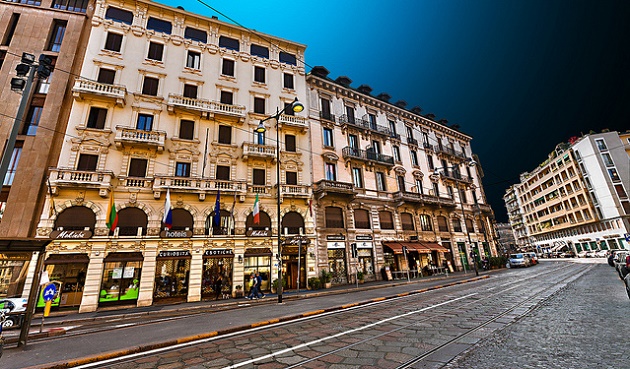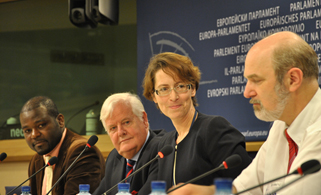The Italian Evangelical Alliance “welcomes the decision”, because the law “made it very difficult, if not impossible, to obtain the authorization to open a new worship place.”
SOURCES Italian Evangelical Alliance, Evangelical Focus AUTHOR Evangelical Focus MILANO 09 MARCH 2016
The Italian region of Lombardy (north, Milano) will not be able to severely restrict the opening of new worship places. The so-called ‘anti-mosque law’ could have affected many evangelical churches.
“The Italian Evangelical Alliance (AEI) welcomes the decision of the Constitutional Court to receive the appeal of the Government on the Lombardia regional law on the places of worship”, the AEI said in a statement.
The Court rejected almost unanimously the regional law, “which established much narrower rules to open new worship places”. The law was declared “discriminatory” and illegitimate.
“The AEI reported the matter to the European representative institutions, but was also helped by several other bodies such as the City of Milan, the Italian Federation of Evangelical Churches (FCEI) and the National Evangelical Conference (COEN)”, the statement says.
A LONG BATTLE
In January 2015, pastor and AEI Religious Liberty Representative Stefano Bogliolo denounced in an article these restrictions to religious freedom are “particularly felt in Lombardy, due to a regional planning law, of 2005, commissioned by the Lega Nord, which prevents the use for purposes of worship of buildings that are not born with the intended use.”
This law also anticipated that any approval of new places of worship would be subject to obtaining the favourable opinions of “organizations, local citizen committees, members and representatives of the police forces as well as provincial police-headquarters and the prefecture.”
OPENING NEW CHURCH BUILDINGS, ALMOST IMPOSSIBLE
 The law established “a number of restrictions that would have made it very difficult, if not impossible, to obtain the authorization to open a new worship place. Among these, for example, the possibility to convene a referendum among the citizens to block the construction or again, the obligation to install cameras in the perimeter of the structure, connected with the police station; the availability of large parking areas at least twice the surface of the building; and more.”
Evangelicals would have fallen “in the net of the regional law known as ‘the anti-mosque law’”.
“Several evangelical churches made mostly by immigrants but even Italians were forced to shut down, and, in some cases, even their properties were confiscated.”
“VEREDICT IS STEP IN RIGHT DIRECTION”
The AEI closes its statement: “The full accomplishment of religious liberty in Italy still remains a long path, but certainly the verdict of the Court today is a step in the right direction.”
The law established “a number of restrictions that would have made it very difficult, if not impossible, to obtain the authorization to open a new worship place. Among these, for example, the possibility to convene a referendum among the citizens to block the construction or again, the obligation to install cameras in the perimeter of the structure, connected with the police station; the availability of large parking areas at least twice the surface of the building; and more.”
Evangelicals would have fallen “in the net of the regional law known as ‘the anti-mosque law’”.
“Several evangelical churches made mostly by immigrants but even Italians were forced to shut down, and, in some cases, even their properties were confiscated.”
“VEREDICT IS STEP IN RIGHT DIRECTION”
The AEI closes its statement: “The full accomplishment of religious liberty in Italy still remains a long path, but certainly the verdict of the Court today is a step in the right direction.”
 The law established “a number of restrictions that would have made it very difficult, if not impossible, to obtain the authorization to open a new worship place. Among these, for example, the possibility to convene a referendum among the citizens to block the construction or again, the obligation to install cameras in the perimeter of the structure, connected with the police station; the availability of large parking areas at least twice the surface of the building; and more.”
Evangelicals would have fallen “in the net of the regional law known as ‘the anti-mosque law’”.
“Several evangelical churches made mostly by immigrants but even Italians were forced to shut down, and, in some cases, even their properties were confiscated.”
“VEREDICT IS STEP IN RIGHT DIRECTION”
The AEI closes its statement: “The full accomplishment of religious liberty in Italy still remains a long path, but certainly the verdict of the Court today is a step in the right direction.”
The law established “a number of restrictions that would have made it very difficult, if not impossible, to obtain the authorization to open a new worship place. Among these, for example, the possibility to convene a referendum among the citizens to block the construction or again, the obligation to install cameras in the perimeter of the structure, connected with the police station; the availability of large parking areas at least twice the surface of the building; and more.”
Evangelicals would have fallen “in the net of the regional law known as ‘the anti-mosque law’”.
“Several evangelical churches made mostly by immigrants but even Italians were forced to shut down, and, in some cases, even their properties were confiscated.”
“VEREDICT IS STEP IN RIGHT DIRECTION”
The AEI closes its statement: “The full accomplishment of religious liberty in Italy still remains a long path, but certainly the verdict of the Court today is a step in the right direction.”







